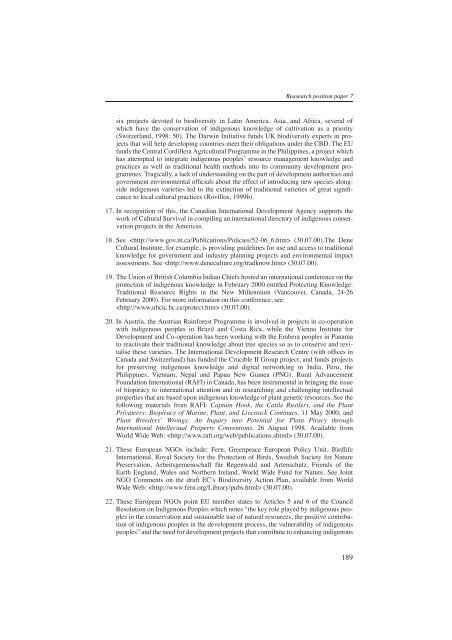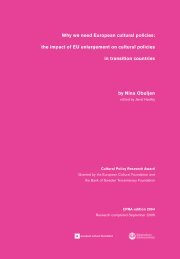<strong>Differing</strong> <strong>diversities</strong>12. For this reason, Austria has committed itself to the objective <strong>of</strong> sustainable agriculturewhich “couples an ecological, site-specific adaptation <strong>of</strong> production methods to ahighly structured and diverse cultural landscape” (Austria, 1997: 14). Agricultural policyin Switzerland aims “to sustain forms <strong>of</strong> traditional exploitation, particularly thosewhich have contributed to the formation <strong>of</strong> landscapes and to increase the diversity <strong>of</strong>ecosystems” (Switzerland, 1998: 33), whereas the United Kingdom recognises “theimportance <strong>of</strong> those traditional skills and practices upon which many valued habitatsdepend” (United Kingdom, 1998: 28). Switzerland has long had legislation – theFederal Law on the Protection <strong>of</strong> Nature and Landscape (1966) – designed “to preserveindigenous animal and plant species, biotopes and landscapes” (Switzerland, 1998: 15),a land planning law – the Federal Law on Land-Use Planning (1979) – that allows forthe protection <strong>of</strong> areas “<strong>of</strong> great ecological or cultural importance” (Switzerland, 1998:16) and, most recently, a fund <strong>of</strong> 50 million Swiss francs was established “to contributeto the conservation <strong>of</strong> traditional rural landscapes, and to safeguard ancient methods <strong>of</strong>exploitation, cultural heritage, and natural landscapes” (Switzerland, 1998: 17).13. Commitments to traditional cultivation methods may be matched by “compensationpayments for disadvantaged areas” (Austria, 1997: 26) that serve to encourage farmersin marginal areas, such as montane farming zones, from abandoning agriculture andthereby help to ensure the continuing cultivation <strong>of</strong> local biodiversity. More generally,agro-environmental grants and “ecological compensation” programmes have beenestablished by <strong>Council</strong> Parties to remunerate farmers for conservation activities, cultivation<strong>of</strong> traditional varieties, sowing indigenous wild plants in fallow lands and gardens,engaging in organic and integrated agriculture, safeguarding biotopes, and ascompensation for lost income caused by the abandoning <strong>of</strong> the practice <strong>of</strong> more intensiveresource use. More still could be done. It is estimated that <strong>Europe</strong> has lost 75% <strong>of</strong>its plant genetic diversity within the last century and that the revitalisation <strong>of</strong> geneticand cultural diversity will depend upon support for organic plant breeding, the development<strong>of</strong> organically produced seeds and in situ management <strong>of</strong> a “diversity <strong>of</strong> culturalplants [which have] evolved from generation to generation, in hands <strong>of</strong> manyfarmers and in many different landscapes” (Wyss and Wiethaler, 2000: 37). On thesepoints, see Wyss and Wiethaler, 2000. The report provides information on the organicbreeding sector in all <strong>of</strong> the <strong>Europe</strong>an <strong>Council</strong> Parties except Bulgaria. A database <strong>of</strong>available organic seeds and a bulletin board for exchange <strong>of</strong> information on organicbreeding and propagation will be created at . For a series <strong>of</strong>studies on the importance <strong>of</strong> preserving agricultural genetic diversity in situ, see Brush,2000.14. The Swiss Federal Office <strong>of</strong> Agriculture, following upon the FAO’s World Plan <strong>of</strong>Action, emphasised preserving the adaptive potential <strong>of</strong> cultivated plants. To this end,the Swiss Commission for the Conservation <strong>of</strong> Cultivated Plants has attempted toinventory all concerned institutions and the genetic material that they safeguard. TheMillennium Seedbank Project at the Royal Botanic Gardens in the United Kingdomboth banks and supports the reintroduction <strong>of</strong> plant species and the CommonwealthPotato Collection is also an important repository.15. Switzerland, for instance, has supported projects to conserve biological and culturaldiversity in the region <strong>of</strong> Lake Onrid, between Albania and Macedonia, in addition toother ecosystem management projects in Estonia, Hungary, Bulgaria and Russia. TheUK Darwin Initiative has supported the development <strong>of</strong> local expertise in peatlandmanagement in eastern <strong>Europe</strong>.16. The Belgian government, for example, has invested in regional environmental managementand database projects in west and central Africa (as well as in China and eastern<strong>Europe</strong>) but the cultural dimensions <strong>of</strong> these initiatives are underdeveloped. The SwissAgency for Development and Co-operation, on the other hand, has a portfolio <strong>of</strong> thirty-188
Reasearch position paper 7six projects devoted to biodiversity in Latin America, Asia, and Africa, several <strong>of</strong>which have the conservation <strong>of</strong> indigenous knowledge <strong>of</strong> cultivation as a priority(Switzerland, 1998: 50). The Darwin Initiative funds UK biodiversity experts in projectsthat will help developing countries meet their obligations under the CBD. The EUfunds the Central Cordillera Agricultural Programme in the Philippines, a project whichhas attempted to integrate indigenous peoples’ resource management knowledge andpractices as well as traditional health methods into its community development programmes.Tragically, a lack <strong>of</strong> understanding on the part <strong>of</strong> development authorities andgovernment environmental <strong>of</strong>ficials about the effect <strong>of</strong> introducing new species alongsideindigenous varieties led to the extinction <strong>of</strong> traditional varieties <strong>of</strong> great significanceto local cultural practices (Rovillos, 1999b).17. In recognition <strong>of</strong> this, the Canadian International Development Agency supports thework <strong>of</strong> Cultural Survival in compiling an international directory <strong>of</strong> indigenous conservationprojects in the Americas.18. See (30.07.00).The DeneCultural Institute, for example, is providing guidelines for use and access to traditionalknowledge for government and industry planning projects and environmental impactassessments. See (30.07.00).19. The Union <strong>of</strong> British Columbia Indian Chiefs hosted an international conference on theprotection <strong>of</strong> indigenous knowledge in February 2000 entitled Protecting Knowledge:Traditional Resource Rights in the New Millennium (Vancouver, Canada, 24-26February 2000). For more information on this conference, see: (30.07.00).20. In Austria, the Austrian Rainforest Programme is involved in projects in co-operationwith indigenous peoples in Brazil and Costa Rica, while the Vienna Institute forDevelopment and Co-operation has been working with the Embera peoples in Panamato reactivate their traditional knowledge about tree species so as to conserve and revitalisethese varieties. The International Development Research Centre (with <strong>of</strong>fices inCanada and Switzerland) has funded the Crucible II Group project, and funds projectsfor preserving indigenous knowledge and digital networking in India, Peru, thePhilippines, Vietnam, Nepal and Papua New Guinea (PNG). Rural AdvancementFoundation International (RAFI) in Canada, has been instrumental in bringing the issue<strong>of</strong> biopiracy to international attention and in researching and challenging intellectualproperties that are based upon indigenous knowledge <strong>of</strong> plant genetic resources. See thefollowing materials from RAFI: Captain Hook, the Cattle Rustlers, and the PlantPrivateers: Biopiracy <strong>of</strong> Marine, Plant, and Livestock Continues, 11 May 2000; andPlant Breeders’ Wrongs: An Inquiry into Potential for Plant Piracy throughInternational Intellectual Property Conventions, 26 August 1998. Available fromWorld Wide Web: (30.07.00).21. These <strong>Europe</strong>an NGOs include: Fern, Greenpeace <strong>Europe</strong>an Policy Unit, BirdlifeInternational, Royal Society for the Protection <strong>of</strong> Birds, Swedish Society for NaturePreservation, Arbeitsgemeinschaft für Regenwald und Artenschutz, Friends <strong>of</strong> theEarth England, Wales and Northern Ireland, World Wide Fund for Nature. See JointNGO Comments on the draft EC’s Biodiversity Action Plan, available from WorldWide Web: (30.07.00).22. These <strong>Europe</strong>an NGOs point EU member states to Articles 5 and 6 <strong>of</strong> the <strong>Council</strong>Resolution on Indigenous Peoples which notes “the key role played by indigenous peoplesin the conservation and sustainable use <strong>of</strong> natural resources, the positive contribution<strong>of</strong> indigenous peoples in the development process, the vulnerability <strong>of</strong> indigenouspeoples” and the need for development projects that contribute to enhancing indigenous189
- Page 5 and 6:
PrefaceThe present text constitutes
- Page 7:
Part IDiffering diversities:transve
- Page 11 and 12:
The study: background, contextand m
- Page 13 and 14:
Transversal study on the theme of c
- Page 15:
Transversal study on the theme of c
- Page 18:
Differing diversitiesi. new forms o
- Page 23 and 24:
IntroductionTransversal perspective
- Page 25 and 26:
Transversal study on the theme of c
- Page 27 and 28:
The challenge of diversityCulture,
- Page 29 and 30:
Transversal study on the theme of c
- Page 31 and 32:
Transversal study on the theme of c
- Page 33 and 34:
Diversity, citizenship, and cultura
- Page 35 and 36:
Transversal study on the theme of c
- Page 37:
Transversal study on the theme of c
- Page 40 and 41:
Differing diversitieslanguages. The
- Page 42 and 43:
Differing diversitiesprogrammes int
- Page 45 and 46:
Culture, government and diversity:p
- Page 47 and 48:
Transversal study on the theme of c
- Page 49 and 50:
Transversal study on the theme of c
- Page 51 and 52:
Transversal study on the theme of c
- Page 53:
Transversal study on the theme of c
- Page 56 and 57:
Differing diversitiesin the pursuit
- Page 58 and 59:
Differing diversitiesthe need for m
- Page 60 and 61:
Differing diversitiescircumstances
- Page 62 and 63:
Differing diversitiesclasses artist
- Page 64 and 65:
Differing diversitiesMy point, then
- Page 66 and 67:
Differing diversitiesiii. that the
- Page 69:
Transversal study on the theme of c
- Page 73 and 74:
The consequences of European media
- Page 75 and 76:
Reasearch position paper 1and contr
- Page 77 and 78:
Reasearch position paper 1directly
- Page 79 and 80:
Reasearch position paper 1There hav
- Page 81 and 82:
Reasearch position paper 1presence
- Page 83 and 84:
Reasearch position paper 1Strategic
- Page 85 and 86:
Reasearch position paper 1New media
- Page 87 and 88:
Reasearch position paper 1Blumler,
- Page 89 and 90:
Reasearch position paper 1Hoffmann-
- Page 91 and 92:
Reasearch position paper 1Pauwels,
- Page 93 and 94:
Assessing the implementationof cult
- Page 95 and 96:
Reasearch position paper 2tics abou
- Page 97 and 98:
Reasearch position paper 2Act (GPRA
- Page 99 and 100:
Reasearch position paper 2factually
- Page 101 and 102:
Reasearch position paper 2The evalu
- Page 103 and 104:
Reasearch position paper 2capacity
- Page 105 and 106:
Reasearch position paper 2Luchtenbe
- Page 107 and 108:
The cultural policies of the Europe
- Page 109 and 110:
Reasearch position paper 3went, wou
- Page 111 and 112:
Reasearch position paper 3The histo
- Page 113 and 114:
Reasearch position paper 3integrati
- Page 115 and 116:
Reasearch position paper 3of differ
- Page 117 and 118:
Reasearch position paper 3European
- Page 119 and 120:
Reasearch position paper 3voice to
- Page 121:
Reasearch position paper 3Howe, Mar
- Page 124 and 125:
Differing diversitiesContemporary d
- Page 126 and 127:
Differing diversitiesWhereas in the
- Page 128 and 129:
Differing diversitiesbuilding on th
- Page 130 and 131:
Differing diversitieswhen tackling
- Page 132 and 133:
Differing diversitiesand that is pr
- Page 134 and 135:
Differing diversitiesSennett, Richa
- Page 136 and 137:
Differing diversitiesallowing their
- Page 138 and 139: Differing diversitiesNevertheless,
- Page 140 and 141: Differing diversitiesgrowth also ex
- Page 142 and 143: Differing diversitiesAt a deeper le
- Page 144 and 145: Differing diversitiesconventional c
- Page 146 and 147: Differing diversitiesworks, and the
- Page 148 and 149: Differing diversitiesNational sover
- Page 150 and 151: Differing diversitiesSimilarly, at
- Page 152 and 153: Differing diversitiesCoombe, Rosema
- Page 154 and 155: Differing diversitiesWoodmansee, Ma
- Page 156 and 157: Differing diversitiesIndeed, which
- Page 158 and 159: Differing diversitiesThe second maj
- Page 160 and 161: Differing diversitiesexample by Hol
- Page 162 and 163: Differing diversitiesincreased broa
- Page 164 and 165: Differing diversities“Black Carib
- Page 166 and 167: Differing diversitiesBunt, Gary, 19
- Page 169 and 170: Preserving cultural diversity throu
- Page 171 and 172: Reasearch position paper 7unique, t
- Page 173 and 174: Reasearch position paper 7legislati
- Page 175 and 176: Reasearch position paper 7appropria
- Page 177 and 178: Reasearch position paper 7Indeed, m
- Page 179 and 180: Reasearch position paper 7- means t
- Page 181 and 182: Reasearch position paper 7cyberspac
- Page 183 and 184: Reasearch position paper 7extended
- Page 185 and 186: Reasearch position paper 7It is rec
- Page 187: Reasearch position paper 7lose loca
- Page 191 and 192: Reasearch position paper 7and innov
- Page 193 and 194: Reasearch position paper 7Programme
- Page 195 and 196: Reasearch position paper 7Reference
- Page 197 and 198: Reasearch position paper 7Papers on
- Page 199: Reasearch position paper 7Swaminath
- Page 202: Sales agents for publications of th














